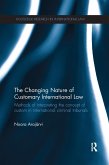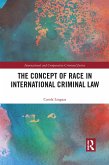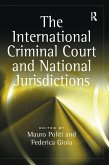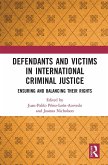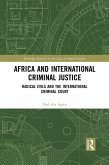Yvonne McDermottCritical Perspectives
The Ashgate Research Companion to International Criminal Law
Critical Perspectives
Herausgeber: Schabas, William A.
Yvonne McDermottCritical Perspectives
The Ashgate Research Companion to International Criminal Law
Critical Perspectives
Herausgeber: Schabas, William A.
- Gebundenes Buch
- Merkliste
- Auf die Merkliste
- Bewerten Bewerten
- Teilen
- Produkt teilen
- Produkterinnerung
- Produkterinnerung
This unique research companion takes a critical approach to a wide variety of theoretical, practical, legal and policy issues surrounding and underpinning the operation of international criminal law as applied by international criminal tribunals.
Andere Kunden interessierten sich auch für
![The Criminal Law of Genocide The Criminal Law of Genocide]() Paul BehrensThe Criminal Law of Genocide53,99 €
Paul BehrensThe Criminal Law of Genocide53,99 €![The Changing Nature of Customary International Law The Changing Nature of Customary International Law]() Noora Arajarvi (New York United Nations)The Changing Nature of Customary International Law81,99 €
Noora Arajarvi (New York United Nations)The Changing Nature of Customary International Law81,99 €![The Concept of Race in International Criminal Law The Concept of Race in International Criminal Law]() Carola LingaasThe Concept of Race in International Criminal Law42,99 €
Carola LingaasThe Concept of Race in International Criminal Law42,99 €![The International Criminal Court and National Jurisdictions The International Criminal Court and National Jurisdictions]() Federica GioiaThe International Criminal Court and National Jurisdictions78,99 €
Federica GioiaThe International Criminal Court and National Jurisdictions78,99 €![Defendants and Victims in International Criminal Justice Defendants and Victims in International Criminal Justice]() Defendants and Victims in International Criminal Justice42,99 €
Defendants and Victims in International Criminal Justice42,99 €![Sexualised Crimes, Armed Conflict and the Law Sexualised Crimes, Armed Conflict and the Law]() Hannah BaumeisterSexualised Crimes, Armed Conflict and the Law42,99 €
Hannah BaumeisterSexualised Crimes, Armed Conflict and the Law42,99 €![Africa and International Criminal Justice Africa and International Criminal Justice]() Fred AgwuAfrica and International Criminal Justice42,99 €
Fred AgwuAfrica and International Criminal Justice42,99 €-
-
-
This unique research companion takes a critical approach to a wide variety of theoretical, practical, legal and policy issues surrounding and underpinning the operation of international criminal law as applied by international criminal tribunals.
Hinweis: Dieser Artikel kann nur an eine deutsche Lieferadresse ausgeliefert werden.
Hinweis: Dieser Artikel kann nur an eine deutsche Lieferadresse ausgeliefert werden.
Produktdetails
- Produktdetails
- Verlag: Taylor & Francis Ltd
- Seitenzahl: 554
- Erscheinungstermin: 1. Januar 1900
- Englisch
- Abmessung: 250mm x 171mm x 51mm
- Gewicht: 1154g
- ISBN-13: 9781409419181
- ISBN-10: 1409419185
- Artikelnr.: 42358301
- Herstellerkennzeichnung
- Libri GmbH
- Europaallee 1
- 36244 Bad Hersfeld
- gpsr@libri.de
- Verlag: Taylor & Francis Ltd
- Seitenzahl: 554
- Erscheinungstermin: 1. Januar 1900
- Englisch
- Abmessung: 250mm x 171mm x 51mm
- Gewicht: 1154g
- ISBN-13: 9781409419181
- ISBN-10: 1409419185
- Artikelnr.: 42358301
- Herstellerkennzeichnung
- Libri GmbH
- Europaallee 1
- 36244 Bad Hersfeld
- gpsr@libri.de
William Schabas is Professor of International Law at Middlesex University, UK, Yvonne McDermott is Lecturer in Law at Bangor University, UK and Niamh Hayes is Head of Office at the Institute for International Criminal Investigations, The Hague, the Netherlands.
Contents: Preface; Introduction, Niamh Hayes, Yvonne McDermott and William
A. Schabas; Part I International Crimes and Modes of Liability: Sisyphus
wept: prosecuting sexual violence at the International Criminal Court,
Niamh Hayes; Creating a framework for the prosecution of environmental
crimes in international criminal law, Tara Smith; Alleged aggression in
Utopia: a international criminal law examination question for 2020, Roger
S. Clark; The Special Tribunal for Lebanon and terrorism as an
international crime: reflections on the judicial function, Ben Saul; Damned
if you don't: liability for omissions in international criminal law,
Christopher Gosnell; Joint criminal enterprise liability: result orientated
justice, Wayne Jordash. Part II The International Criminal Process: Rights
in reverse: a critical analysis of fair trial rights under international
criminal law, Yvonne McDermott; Victims' participation at the International
Criminal Court: benefit or burden?, Lorraine Smith-van Lin; A shifting
scale of power: who is in charge of the charges at the International
Criminal Court?, Dov Jacobs; Distinguishing creativity from activism:
international criminal law and the 'legitimacy' of judicial development of
the law, Joseph Powderly; Equality of arms in international criminal law:
continuing challenges, Charles Chernor Jalloh and Amy DiBella; Protecting
the rights of the accused in international criminal proceedings: lip
service or affirmative action?, Colleen Rohan; Reconciliation and
sentencing in the practice of the ad hoc tribunals, Silvia D'Ascoli. Part
III Complementarity and Sentencing: a Discussion: A sentence-based theory
of complementarity, Kevin Jon Heller; 'Sentencing horror' or 'sentencing
heuristic'? A reply to Hellers's 'sentence-based' theory of
complementarity, Carsten Stahn; Three theories of complementarity: charge,
sentence or process? A comment on Kevin Heller's sentence-based theory of
complementarity, Darryl Robinson.
A. Schabas; Part I International Crimes and Modes of Liability: Sisyphus
wept: prosecuting sexual violence at the International Criminal Court,
Niamh Hayes; Creating a framework for the prosecution of environmental
crimes in international criminal law, Tara Smith; Alleged aggression in
Utopia: a international criminal law examination question for 2020, Roger
S. Clark; The Special Tribunal for Lebanon and terrorism as an
international crime: reflections on the judicial function, Ben Saul; Damned
if you don't: liability for omissions in international criminal law,
Christopher Gosnell; Joint criminal enterprise liability: result orientated
justice, Wayne Jordash. Part II The International Criminal Process: Rights
in reverse: a critical analysis of fair trial rights under international
criminal law, Yvonne McDermott; Victims' participation at the International
Criminal Court: benefit or burden?, Lorraine Smith-van Lin; A shifting
scale of power: who is in charge of the charges at the International
Criminal Court?, Dov Jacobs; Distinguishing creativity from activism:
international criminal law and the 'legitimacy' of judicial development of
the law, Joseph Powderly; Equality of arms in international criminal law:
continuing challenges, Charles Chernor Jalloh and Amy DiBella; Protecting
the rights of the accused in international criminal proceedings: lip
service or affirmative action?, Colleen Rohan; Reconciliation and
sentencing in the practice of the ad hoc tribunals, Silvia D'Ascoli. Part
III Complementarity and Sentencing: a Discussion: A sentence-based theory
of complementarity, Kevin Jon Heller; 'Sentencing horror' or 'sentencing
heuristic'? A reply to Hellers's 'sentence-based' theory of
complementarity, Carsten Stahn; Three theories of complementarity: charge,
sentence or process? A comment on Kevin Heller's sentence-based theory of
complementarity, Darryl Robinson.
Contents: Preface; Introduction, Niamh Hayes, Yvonne McDermott and William
A. Schabas; Part I International Crimes and Modes of Liability: Sisyphus
wept: prosecuting sexual violence at the International Criminal Court,
Niamh Hayes; Creating a framework for the prosecution of environmental
crimes in international criminal law, Tara Smith; Alleged aggression in
Utopia: a international criminal law examination question for 2020, Roger
S. Clark; The Special Tribunal for Lebanon and terrorism as an
international crime: reflections on the judicial function, Ben Saul; Damned
if you don't: liability for omissions in international criminal law,
Christopher Gosnell; Joint criminal enterprise liability: result orientated
justice, Wayne Jordash. Part II The International Criminal Process: Rights
in reverse: a critical analysis of fair trial rights under international
criminal law, Yvonne McDermott; Victims' participation at the International
Criminal Court: benefit or burden?, Lorraine Smith-van Lin; A shifting
scale of power: who is in charge of the charges at the International
Criminal Court?, Dov Jacobs; Distinguishing creativity from activism:
international criminal law and the 'legitimacy' of judicial development of
the law, Joseph Powderly; Equality of arms in international criminal law:
continuing challenges, Charles Chernor Jalloh and Amy DiBella; Protecting
the rights of the accused in international criminal proceedings: lip
service or affirmative action?, Colleen Rohan; Reconciliation and
sentencing in the practice of the ad hoc tribunals, Silvia D'Ascoli. Part
III Complementarity and Sentencing: a Discussion: A sentence-based theory
of complementarity, Kevin Jon Heller; 'Sentencing horror' or 'sentencing
heuristic'? A reply to Hellers's 'sentence-based' theory of
complementarity, Carsten Stahn; Three theories of complementarity: charge,
sentence or process? A comment on Kevin Heller's sentence-based theory of
complementarity, Darryl Robinson.
A. Schabas; Part I International Crimes and Modes of Liability: Sisyphus
wept: prosecuting sexual violence at the International Criminal Court,
Niamh Hayes; Creating a framework for the prosecution of environmental
crimes in international criminal law, Tara Smith; Alleged aggression in
Utopia: a international criminal law examination question for 2020, Roger
S. Clark; The Special Tribunal for Lebanon and terrorism as an
international crime: reflections on the judicial function, Ben Saul; Damned
if you don't: liability for omissions in international criminal law,
Christopher Gosnell; Joint criminal enterprise liability: result orientated
justice, Wayne Jordash. Part II The International Criminal Process: Rights
in reverse: a critical analysis of fair trial rights under international
criminal law, Yvonne McDermott; Victims' participation at the International
Criminal Court: benefit or burden?, Lorraine Smith-van Lin; A shifting
scale of power: who is in charge of the charges at the International
Criminal Court?, Dov Jacobs; Distinguishing creativity from activism:
international criminal law and the 'legitimacy' of judicial development of
the law, Joseph Powderly; Equality of arms in international criminal law:
continuing challenges, Charles Chernor Jalloh and Amy DiBella; Protecting
the rights of the accused in international criminal proceedings: lip
service or affirmative action?, Colleen Rohan; Reconciliation and
sentencing in the practice of the ad hoc tribunals, Silvia D'Ascoli. Part
III Complementarity and Sentencing: a Discussion: A sentence-based theory
of complementarity, Kevin Jon Heller; 'Sentencing horror' or 'sentencing
heuristic'? A reply to Hellers's 'sentence-based' theory of
complementarity, Carsten Stahn; Three theories of complementarity: charge,
sentence or process? A comment on Kevin Heller's sentence-based theory of
complementarity, Darryl Robinson.



